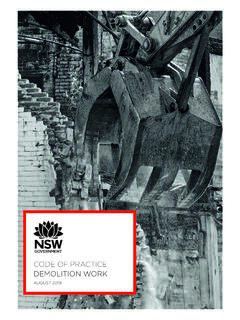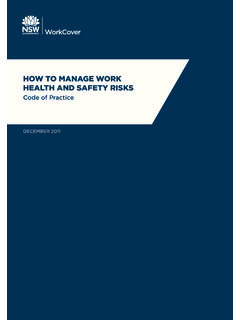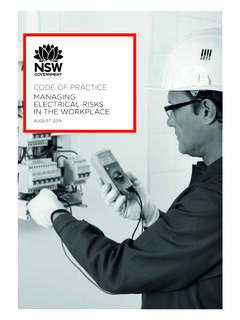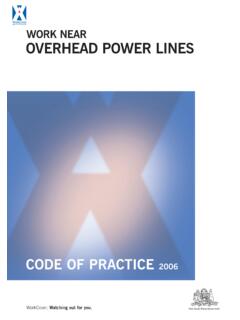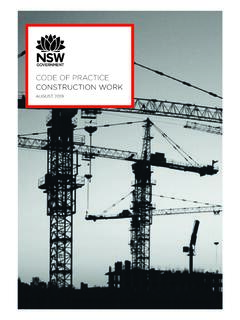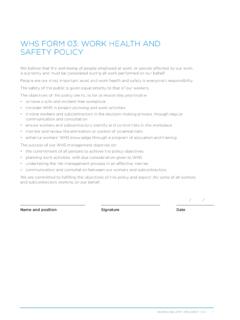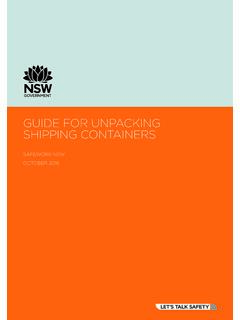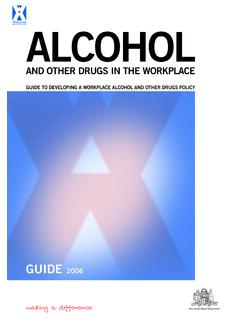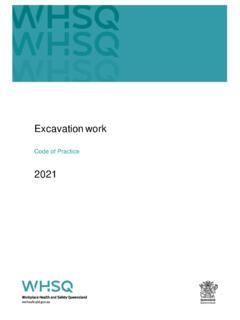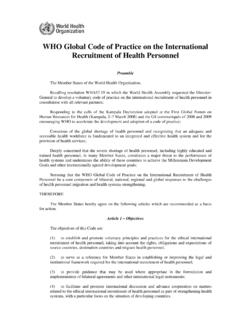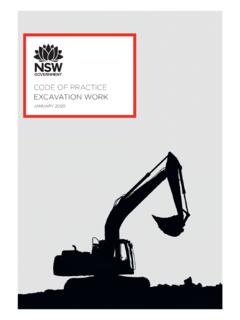Transcription of CODE OF PRACTICE - SafeWork NSW
1 code OF PRACTICEWORK HEALTH AND SAFETY CONSULTATION, cooperation AND COORDINATIONAUGUST 2019 NSW note: This code is based on a national model code of PRACTICE developed by Safe Work Australia under the harmonisation of national work health and safety legislation and has been approved under section 274 of the NSW Work Health and Safety Act 2011. Notice of that approval was published in the NSW Government Gazette referring to this code of PRACTICE as Work Health and Safety Consultation cooperation and coordination (page 7194) on Friday 16 December 2011. This code of PRACTICE commenced on 1 January amendments under section 274 of the NSW Work Health and Safety Act 2011 have been published and commenced as detailed in the list of amendments contained in this for the NSW Government logo, this copyright work is licensed under a Creative Commons Attribution-Non-Commercial Australia view a copy of this licence, visit are free to copy, communicate and adapt the work for non-commercial purposes, as long as you attribute the work to SafeWork NSW and abide by the other licence terms.
2 Contents Foreword .. 5 1. Introduction .. 6 Who has duties in relation to work health and safety consultation, cooperation and coordination ? .. 6 Why is consultation important? .. 8 2. When to consult with workers .. 10 Managing work health and safety risks .. 10 Deciding on welfare facilities .. 11 Making changes affecting work health and safety .. 11 Developing work health and safety procedures .. 11 3. What is effective consultation? .. 13 Sharing information .. 13 Providing reasonable opportunities to express views and contribute .. 14 Taking views into account .. 14 Advising outcomes of 15 To what extent should you consult? .. 15 Must consultation be documented? .. 15 4. How to consult with workers .. 17 What kind of consultation is best for your workplace?.. 17 Agreeing on consultation procedures .. 18 Consulting using health and safety representatives and committees.
3 19 Sharing consultation arrangements with other duty holders .. 21 How should the consultation arrangements be reviewed? .. 22 5. When to consult, cooperate and coordinate activities with other duty holders .. 23 Who must consult, cooperate and coordinate and with whom .. 24 When must you consult, cooperate and coordinate with others? .. 24 6. What is effective consultation with other duty holders? .. 26 What is meant by cooperation ? .. 26 What is meant by coordination ? .. 27 What if another duty holder refuses to consult or cooperate or coordinate? .. 27 Appendix A Glossary .. 28 Appendix B Examples of consultation arrangements .. 30 Example 1: Consultation in a workplace with no health and safety representatives .. 30 Example 2: Consultation in a workplace with health and safety representatives .. 31 Appendix C Consulting, cooperating and coordinating activities.
4 33 Example 1: Sharing the same workplace .. 33 Work health and safety consultation, cooperation and coordination code of PRACTICE Page 4 of 42 Example 2: Sharing the same workers .. 34 Example 3: Running an event with other duty holders .. 34 Appendix D Consultation checklist .. 37 Appendix E Consultation requirements in the WHS Regulation .. 39 Amendments .. 41 Work health and safety consultation, cooperation and coordination code of PRACTICE Page 5 of 42 Foreword This code of PRACTICE on how to meet the requirements for consultation, cooperation and coordination on work health and safety matters is an approved code of PRACTICE under section 274 of the Work Health and Safety Act (the WHS Act). An approved code of PRACTICE provides practical guidance on how to achieve the standards of work health and safety required under the WHS Act and the Work Health and Safety Regulation (the WHS Regulation) and effective ways to identify and manage risks.
5 A code of PRACTICE can assist anyone who has a duty of care in the circumstances described in the code of PRACTICE . Following an approved code of PRACTICE will assist the duty holder to achieve compliance with the health and safety duties in the WHS Act and WHS Regulation, in relation to the subject matter of the code of PRACTICE . Like regulations, codes of PRACTICE deal with particular issues and may not cover all relevant hazards or risks. The health and safety duties require duty holders to consider all risks associated with work, not only those for which regulations and codes of PRACTICE exist. Codes of PRACTICE are admissible in court proceedings under the WHS Act and WHS Regulation. Courts may regard a code of PRACTICE as evidence of what is known about a hazard, risk, risk assessment or risk control and may rely on the code in determining what is reasonably practicable in the circumstances to which the code of PRACTICE relates.
6 For further information see the Interpretive Guideline: The meaning of reasonably practicable . Compliance with the WHS Act and WHS Regulation may be achieved by following another method if it provides an equivalent or higher standard of work health and safety than the code . An inspector may refer to an approved code of PRACTICE when issuing an improvement or prohibition notice. Scope and application This code is intended to be read by a person conducting a business or undertaking (PCBU). It provides practical guidance to PCBUs on how to effectively consult with workers who carry out work for the business or undertaking and who are (or are likely to be) directly affected by a health and safety matter. It includes information on mechanisms to facilitate worker participation and representation. This code also provides guidance to PCBUs who share responsibility for the same work health and safety matter on how to consult, cooperate and coordinate activities with each other.
7 This code may be a useful reference for other persons interested in the duties under the WHS Act and WHS Regulation. This code applies to all workplaces covered by the WHS Act where work health and safety consultation, cooperation and coordination is required. How to use this code of PRACTICE This code includes references to the legal requirements under the WHS Act and WHS Regulation. These are included for convenience only and should not be relied on in place of the full text of the WHS Act or WHS Regulation. The words must , requires or mandatory indicate a legal requirement exists that must be complied with. The word should is used in this code to indicate a recommended course of action, while may is used to indicate an optional course of action. Work health and safety consultation, cooperation and coordination code of PRACTICE Page 6 of 42 1.
8 Introduction Who has duties in relation to work health and safety consultation, cooperation and coordination ? Duty holders who have a role in either consultation, cooperation or coordination include: persons conducting a business or undertaking (PCBUs) designers, manufacturers, importers, suppliers and installers of plant, substances or structures, and officers. Workers and other persons at the workplace also have duties under the WHS Act, such as the duty to take reasonable care for their own health and safety at the workplace. A person can have more than one duty and more than one person can have the same duty at the same time. Early consultation and identification of risks can allow for more options to eliminate or minimise risks and reduce the associated costs. Person conducting a business or undertaking PCBUs have a duty to consult workers about work health and safety and may also have duties to consult, cooperate and coordinate with other duty holders.
9 Consulting workers WHS Act section 47 Duty to consult workers A PCBU must consult, so far as is reasonably practicable, with workers who carry out work for the business or undertaking and who are (or are likely to be) directly affected by a health and safety matter. This duty to consult is based on the recognition that worker input and participation improves decision-making about health and safety matters and assists in reducing work-related injuries and disease. The broad definition of a worker under the WHS Act means a PCBU must consult with employees and anyone else who carries out work for the business or undertaking. A PCBU must consult, so far as is reasonably practicable, with contractors and subcontractors and their employees, on-hire workers, outworkers, apprentices, trainees, work experience students, volunteers and other people who are working for the PCBU and who are, or are likely to be, directly affected by a health and safety matter.
10 Workers are entitled to take part in consultations and to be represented in consultations by a health and safety representative who has been elected to represent their work group. Work health and safety consultation, cooperation and coordination code of PRACTICE Page 7 of 42 Consulting, cooperating and coordinating activities with other duty holders WHS Act section 46 Duty to consult with other duty holders The WHS Act requires a PCBU to consult, cooperate and coordinate activities with all other persons who have a work health or safety duty in relation to the same matter, so far as is reasonably practicable. There is often more than one business or undertaking with responsibility for the same health and safety matters, either because they are involved in the same activities or share the same workplace. In these situations, each duty holder should exchange information to find out who is doing what and work together in a cooperative and coordinated way so risks are eliminated or minimised so far as is reasonably practicable.
